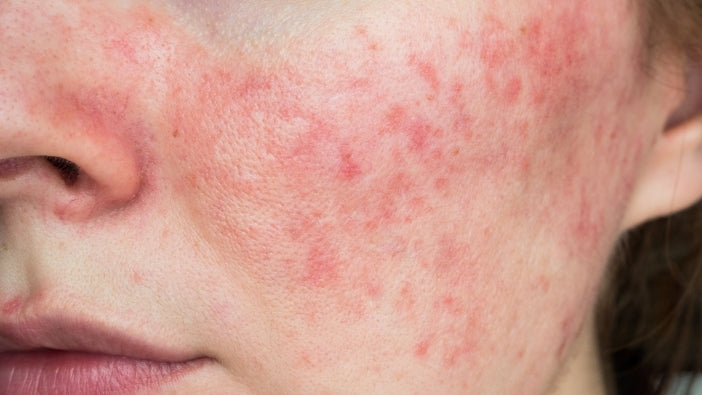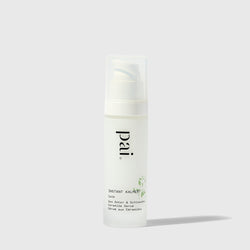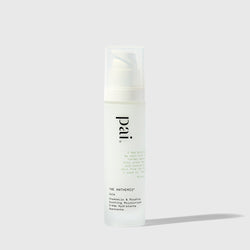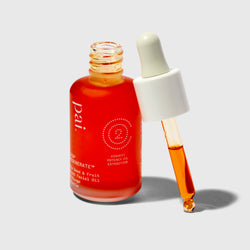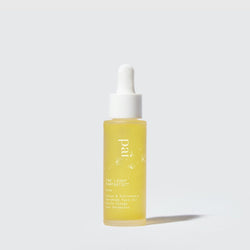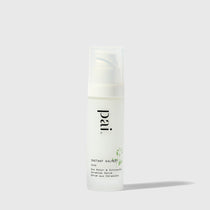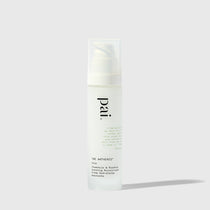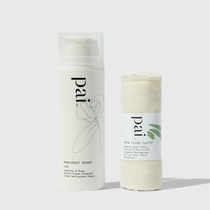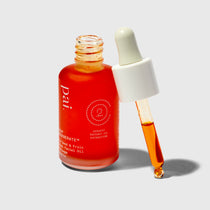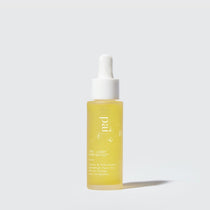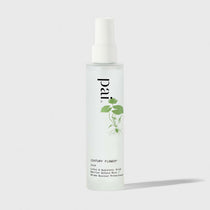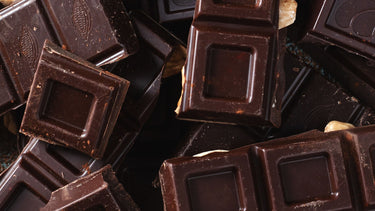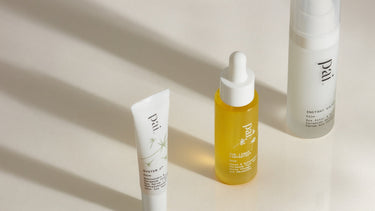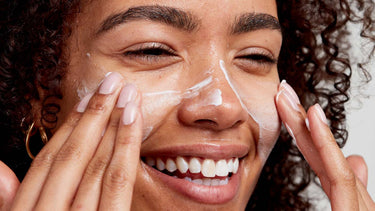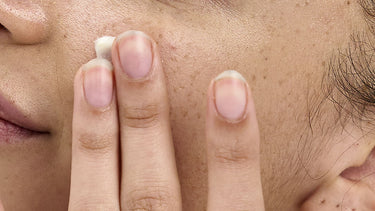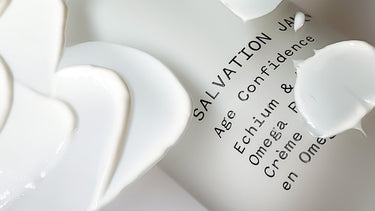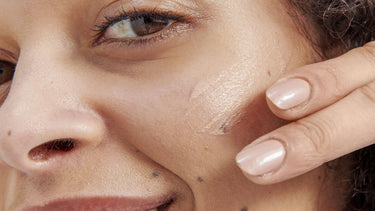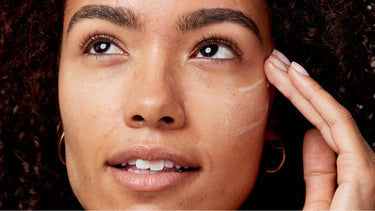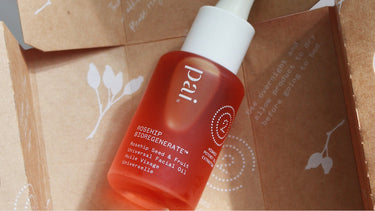Rosacea is a very common, but often very disruptive skin condition – and it’s something we see in a lot of customers who come to Pai seeking skincare to calm it down. So consider this your fact sheet: we’ll explain what rosacea is, the typical triggers and the best products to treat it.
What is rosacea?
Rosacea is a chronic condition that causes blood vessels to enlarge, giving a flushed appearance to the upper cheeks and nose. Symptoms include redness, inflammation, dilated capillaries and, in some cases, small hard spots and pustules. The skin will also feel hot or warm, and as it’s inflamed it could feel tight and sting when using products.
However, how it appears will depend on your skin tone. While those with lighter skin will experience redness, darker skin tones may see a more violet, purple or brown-grey hue - often making it even trickier to diagnose.
Rosacea is most common in women over the age of 30 and – as if you didn’t already have enough on your plate – the condition can also develop during pregnancy. There’s also some evidence to suggest it may be hereditary. It’s never contagious.
What causes rosacea?
While an exact cause is unknown, there are many common rosacea triggers which can kick off a flare-up.
Rosacea-prone skin is very sensitive to temperature. Very cold weather interspersed with blasts of hot, dry central heating can cause flare-ups. Equally, humid and sunny weather can also be a trigger. Other lifestyle triggers unfortunately include caffeine, spicy food, alcohol and sunlight.
Understanding what causes your skin to react is the key in controlling your rosacea. When it comes to temperature, think about ways you can protect yourself. For example, if it’s very cold, try protecting your face with a large scarf or if it’s hot and sunny, stick to the shade. If you're triggered by certain foods or drinks, try to avoid these where possible.
Like many conditions, rosacea is also triggered by stress. Although it’s far easier said than done, try to lower your stress levels with daily meditation or relaxation - or whatever works for you - to help keep flare-ups at bay.
It’s a game of trial and error, which is why it’s a good idea to keep a diary of what causes your rosacea to flare up each day or week, to help identify patterns and triggers specific to you. Start a skin diary to monitor your skin, diet, stress levels and anything else that could be relevant, and soon patterns should emerge. (Need a bit more guidance? Book in for a free consultation with our skin coaches and they’ll help you identify the factors to keep an eye on.)

Skincare ingredients to avoid for rosacea-prone skin
According to the National Rosacea Society, 41% of 1,066 patients surveyed said that certain skincare products aggravated their condition. Choosing gentle skincare products that minimise irritation is key to managing rosacea - but that may mean becoming a bit of an expert at reading ingredient lists.
Many over-the-counter and prescription rosacea treatments and creams contain the irritant Benzoyl Peroxide, which is worth giving a wide berth as it may exacerbate symptoms.
1. Alcohol
Whether you have sensitive skin or not, alcohol is best avoided as a skincare ingredient. Although there are some small benefits to using alcohol as an ingredient, the negative effects of alcohol far outweigh the pros. Such effects include dryness, damaging the skin surface, and diminishing your skin’s natural ability to replenish.
2. Witch Hazel
For those who suffer from rosacea, witch hazel is commonly known to cause irritation. This is primarily because it is often mixed with alcohol during the distillation process. It may provide a short-term solution to your skincare problem, but is likely to cause more issues in the long-term.

3. Fragrance
Fragrance ingredients are likely to cause a negative skin reaction in just about everyone with sensitive skin. It can be quite tricky to tell from the ingredients list whether a product contains fragrance, as there are many different types, with many different names too.
It’s also not always as easy to simply give the product a quick sniff. After all, there are some natural ingredients that smell delightful! Even if the product has no smell, fragrance may have been used to mask an unpleasant smell. Rest assured that at Pai Skincare, we never use fragrance in any of our products - only very small amounts of essential oils, which are carefully selected for sensitive skin. We also have a collection that’s completely fragrance-free (essential oil-free).
4. Menthol
Known for its pleasant cooling sensation, menthol is often used to provide a soothing or pain-reducing effect. In fact, it has a sensitising effect on the skin, meaning that skin is likely to become irritated rather than calmed. It’s also worth remembering that menthol is an alcohol which comes with its own issues already mentioned.
5. Peppermint
Any form of mint oil is generally quite potent and therefore a common trigger for sensitive skin – whether it’s rosacea or dermatitis. They are common triggers of allergic reactions too.
6. Eucalyptus
Eucalyptus may be known for its antibacterial properties, but it’s also a very fragrant oil. This means it’s an ingredient to avoid for rosacea sufferers.


Best products for rosacea-prone skin
As a general rule, we suggest using products which are specifically formulated for sensitive or rosacea-prone skin. Opt for natural and organic ingredients, as these are far less likely to cause irritation.
Stick to soothing and strengthening actives like Chamomile and Rosehip. Rosehip is a fantastic skin healer and strengthener. Chamomile contains azulene, a natural anti-inflammatory which will cool and calm any flushing during a flare-up.
At Pai we have a comprehensive range of products enriched with these ingredients and specifically designed with rosacea and redness-prone skin in mind.
We advise testing products on a small patch of skin before using them all over your face. Check whether a brand offers sample or travel-sized versions of their products. This means you don’t have to invest a fortune in trialling products which may not be suitable for your skin.
At Pai, we not only have travel sizes, we also offer a free 90 day return on any product which is not suitable for your skin.

Tips for managing rosacea
Diet is also important when dealing with all skin allergies, and rosacea is no exception.
Try to increase your intake of Essential Fatty Acids (Omega 3, 6 & 9) as these help to calm and condition the skin from the inside. Oily fish, seeds and nuts are all good sources, as are supplements like a high-grade flaxseed, hemp or fish oil.
Pycnogenol, or pine bark extract, is also believed to be a good natural remedy for rosacea as it has anti-inflammatory, antimicrobial and antioxidant properties.
Further support
Watch Holly's rosacea show now for more advice

Rosacea needs careful handling - so don’t be afraid to seek more support. The Rosacea Society and British Skin Foundation have many useful resources.
You can also book in for a free 10 or 30 minute consultation with one of our skin coaches - they each have their own experiences with skin conditions, including rosacea, so they know how tricky it can be. And if you do want to purchase a product afterwards, we’ll send you an exclusive 15% off code too.
Book a free online skin consultation now for more help, or shop our organic skincare for rosacea here


































